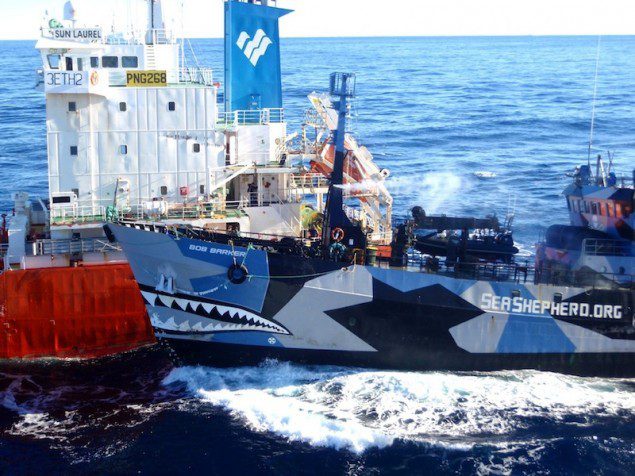The Non-State Navy: Sea Shepherd as a Case Study for 21st Century Maritime Non-State Actors, full article at gcaptain
 |
| Add Sea Shepherd vessel Bob Barker (R) collides with the fuel tanker ship Sun Laurel as Japanese mother survey ship Nissin Maru (R) tries to pull alongside in the Antarctica in this handout photo taken and released by the Institute of Cetacean Research (ICR) February 25, 2013. Mandatory Credit REUTERS/The Institute of Cetacean Research
EDITOR'S NOTE: The captioned photo above and the quote below are from an article in g captain that describes recent developments among non state maritime organizations and recent expanded rulings by U.S. Courts on piracy. American Admiralty Information Systems believes these new developments are harmful to the international order on the high seas. Increasingly violent and dangerous actions by organizations like SeaShepherd and Green Peace endanger ships, seamen and the environment. Legally labeling these NGOs as "Pirates" diminishes public support for harsh penalties against traditional pirates, as "assailing bandits". NGOs that violate the peace without the willful intent to sink vessels or harm people and who do cause physical damage should be treated as some sort of "marine vandal" subjecting the ship to seizure, and the crew to such penalties as are prescribed under the flag state of the nation that credentialed them as seamen for reckless and negligent operation. If any one is killed or injured the deck officers on watch at the time of the action should be tried for voluntary manslaughter, and the rest of the crew as accessories. Owning organizations and the crews should be always held to civil liability for their acts.
Some of us here have actually had to deal with Green Peace protestors who endangered safe tanker passage through a narrows. How causing an oil spill by harassing a tanker is supposed to help the environment we don't know. But being buzzed by small craft, or having acid or excrement thrown up on your decks, or fouling a prop in a booby trap laid by one of their vessels just isn't on the same order of danger as being boarded by the traditional assailing bandit type pirate with their direct intent of fully gaining control of your ship and total willingness to use a gun on your crew. The seriously misguided and over the top activists of these marine conservation NGOs just aren't that threatening, despite the fact that their acts are inherently dangerous. They must be held accountable for their acts for what they are vandalism, malicious misconduct, and potentially but so far not yet voluntary manslaughter. Lest you think we've gone soft on "pirates" keep in mind that we have always advocated the "Captain Woods Rogers Solution" for traditional pirates. That solution is to return jurisdiction over pirates directly to the World's Navies to combat, capture, try, and punish pirates , if necessary by drum head courts held on the fantail or quarter deck. That solution worked in the past. Elimination of that solution has resulted in the ineffective "catch and release" programs as the world's navies are forced into trying to find a nation state willing to prosecute captured pirates and witnesses, once all neatly aboard the warship scatter to the far corners of the globe. Keep the NGO delinquents out of the piracy class of unrepentant miscreants. We urge you to read the gcaptain article that we link you to below and consider our opinion, the opinion of experienced mariners and admiralty litigators.
By CDR Chris Rawley, U.S. Navy Reserve and LCDR Claude Berube, U.S. Navy Reserve
"Introduction
The last decade has again reminded us that irregular warfare can be every bit as challenging and deadly as conventional wars, even in the maritime setting. Al-Qaeda in the Arabian Peninsula (AQAP), Somali pirates, and Lebanese Hezbollah have demonstrated at least some capability to challenge the primacy of modern navies at sea. Maritime non-state actors wreaking havoc on the ocean are nothing new. Pirates in particular have menaced merchants and navies around the world for hundreds of years. But the advent of transnational terror groups with IEDs or modern anti-ship missiles capable of destroying a warship is fairly recent. The evolution of these non-state actors at sea challenges the conventional definitions of a naval force."
For the Full Article: http://gcaptain.com/non-state-navy-shepherd-case/
A permanent link to gcaptain is in our NEWS SERVICE pages we recommend gcaptain as daily reading for marine managerial and operational professionals.
|
No comments:
Post a Comment